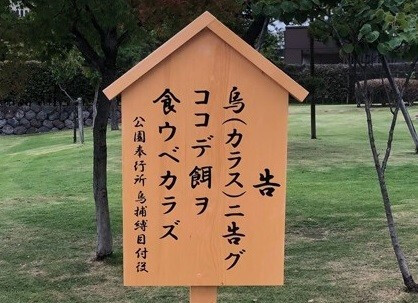Oh boy, my first time taking a look at N1 grammar. Big fun  I seem to have mostly gathered a bunch of example sentences at this point though instead of taking a deeper look into the grammar point… Oh well, still a few days remaining to dive deeper into its exact workings.
I seem to have mostly gathered a bunch of example sentences at this point though instead of taking a deeper look into the grammar point… Oh well, still a few days remaining to dive deeper into its exact workings.
べからず [Part one]
A formal phrase, could be considered a grammar leftover from classical Japanese. It has the meaning of must not, do not, should not. An auxilary verb that indicates a strong prohibition.
How to use
Verb-dictionary form + べからず / べからざる
!Exception : する can be すべからず
見る → 見るべからず
する → すべからず
する → するべからず
する → すべからずる
べからず is a negative form of べし (should, ought to). It expresses a strong prohibition and is used only in written language. The prenominal form of べからず is べからざる , which is the written version of べきでない.
(1)それは
(2)
There are five expressions that are synonymous with べからず, and they can be ordered by degree of prohibitiveness. The order is as follows, from most prohibitive to least :
-
な
-
べからず
-
きんず(る)
-
禁止
-
てはいけません (てはいけない・てはならない)
-
ないでください
-
ないようにしてください
It seems that all of the above can be used interchangeably in a sentence, and these will determine how prohibitive something is exactly. If someone knows of any exceptions to this, please let me know, because I haven’t found any mentions on this.
While not mentioned among its synonyms under related grammar on BunPro, or elsewhere, I also want to take a closer look at one more related grammar point for this one of the coming days, namely :
- 可きではない (or 可きでない)
- Set expressions using べからず / べからざる
So, as mentioned on the main grammar page for べからず, it seems that べからざる is mostly used in a few set expression, e.g. :
許すべからざる罪 → an unforgiveable sin
欠くべからざる物 → absolutely necessary things (= things that cannot be lacking)
Example sentences :
- ビル
内 でタバコを吸 うべからず。(No smoking inside the building!) -
彼 はわがチームには欠 くべからざる選手 である。(He is an indespensible player for our team) -
働 かざるもの食 うべからず。(Those that don’t work, don’t eat). - ここまでくるはよいが、
先 へ進 むべからず。(You may come up to here, but no further) -
関係者 以外 立 ち入 るべからず。(Authorized personnel only) -
首相 は自由 に発言 するべからざる人 です。(The Prime Minister is a man who should not be allowed to speak freely) - そこはだれでも
入 るべからざるところです。(That’s a place that no one should enter) -
親 でも子供 を激 しくしかるべからある人 です。(He’s a parent who shouldn’t be too hard on his children) -
学生 は先生 にひどい言葉 を使 って皮肉 するのはありうべからざる行動 です。(Students are not supposed to be sarcastic and use horrible words with their teachers) -
基礎 のことを忘 れるべからざる。(Don’t forget the fundamentals) -
芝 に入 るべからず。(Keep off the lawn) -
原子力 はえねるぎー源 として欠 くべからざるものとなっている。(Atomic Energy has become indispensable as a source of energy) -
読 むべからず。(You shouldn’t read it) -
食 べるべからず。(Don’t eat [it]) -
盗作 をすべからず。(You shouldn’t plagiarize) - あるべからざる
状態 。(A situation that shouldn’t exist) -
必要 欠 くべからあるもの。(An indispensable thing) -
否定 すべからざる事実 。(An undeniable fact) -
電車 の中 で携帯 電話 を使 うべからず。(You ought not use your cell phone in the train) -
授業中 に隣 の者 私語 をするべからず。(You shouldn’t talk in class with your neighbours) -
無用 の者 、入 るべからず。 (No trespassing) -
虚言 を吐 くべからず。(Don’t tell a lie)
A fun one with a pun I came across on this article :

From the article :
“告 烏(カラス)二告グ ココデ餌ヲ食ゥベカラズ
公園奉行所烏捕縛目付役
Notice To all Crows You must not eat here
Crow Control Overseer, Park Magistrate’s Office
(Toyama Castle Grounds sign addressed to the local crows. It scares away crows by attracting (human) visitors’ attention. * It also works as a pun on the words べからず and からす (crows).)”
I’ll continue on with my deep dive tomorrow probably, as I feel like I haven’t gotten to the bottom of it yet. Turning in for the night though 


